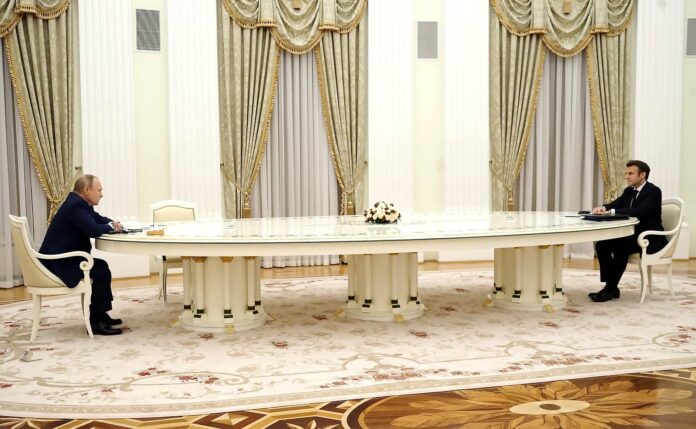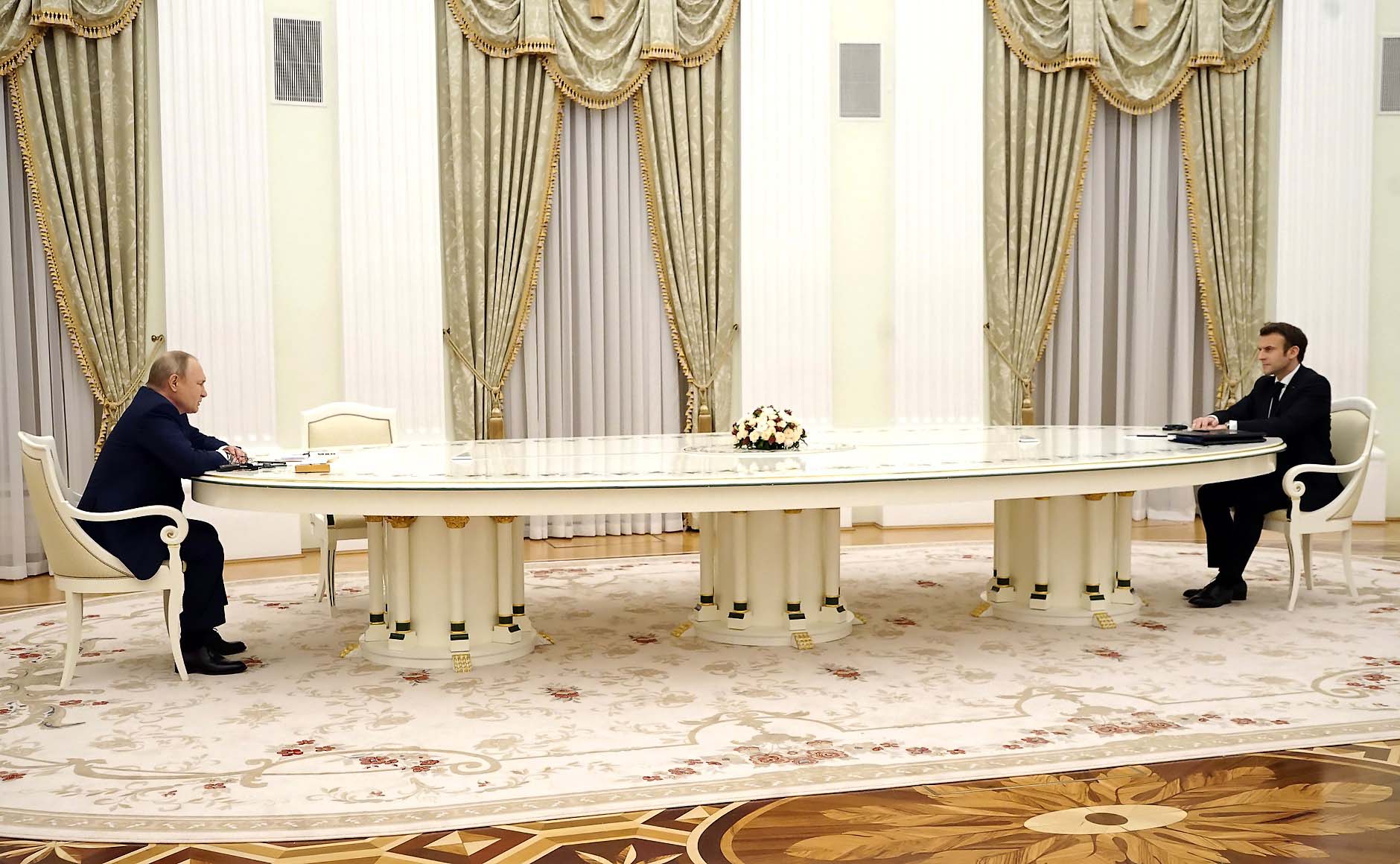During his trip to Moscow and then to Kyiv, President Emmanuel Macron insisted that Ukraine’s sovereignty and territorial integrity were non-negotiable. He also reaffirmed the principles of the 1990 Charter of Paris. In Kyiv, before President Volodymyr Zelenskiy, he recalled the tragic price that the Ukrainian people had paid as a result of Russian aggression. He finally announced his resolution to work towards de-escalation. But beyond the possibility of a new large-scale Russian attack against Ukraine, or other forms of thorough destabilization, it is also the current status quo that must be recalled as unacceptable.
Faced with the threat of a new massive aggression by the Kremlin against Ukraine, the NATO and European Union Allies, beyond certain divergences, have globally reaffirmed their resolution to show a common front against the Russian regime. While this alliance has its flaws — Orbán’s Hungary’s cronyism with Moscow, Berlin’s ambiguities in refusing to supply lethal weapons to Ukraine and to stop the Nord Stream 2 gas pipeline for good — this unity is unprecedented since the fall of the Berlin Wall. This in itself is good news. Emmanuel Macron was careful to consult the Allies—the United States, NATO, the Baltic States, the European Union and Poland—before flying to Moscow and Kyiv.
All in all, this unity or, rather, this firmness accompanied by precise and strong threats against Moscow in case of new attacks, were not present in 2014, let alone in 2008 during the attack against Georgia, not to mention the Syrian case. It should be noted that the Minsk agreements were first, in the minds of François Hollande and Angela Merkel, an emergency measure to stop the bloody Russian attacks against Ukraine. After Barack Obama’s refusal to enforce the red lines he had himself set after the chemical attacks on Ghouta in 2013, the United States was also largely absent when the Russian war against Kyiv was launched. Without this abstention, these agreements, negotiated under duress and in a hurry, would not have been necessary. We can go back further; the indignation aroused by the war crimes committed by Russian forces in 1999-2000 during the second Chechen war quickly subsided after September 11. Neither these, nor the de facto annexation of 20% of Georgian territory, prevented a re-engagement with Putin’s regime and the famous reset launched by Barack Obama in 2009.
But is the current rhetoric of the democracies towards Moscow such as to reassure us about their intentions to act in the face of the threats of the Russian regime? Does their position, however “martial”, really take into account the interests of the Ukrainian people and other peoples of the region who are fighting for freedom? Aren’t there still many ambiguities that could even suggest that once again Putin has succeeded, at least partially, in his maneuver? In short, is this rather unprecedented resolve that many analysts are talking about real? We still have some reasons to doubt it. Putin was undoubtedly surprised by this new Western unity, but he has not yet lost.
First of all, as Vladimir Putin expected in a way, this firm position of the West is only ever aimed at a new Russian military action. Additionally, there are still many unknowns about its real extent, notably in terms of operational military assistance (air intelligence, missile defense, etc.), in case of an attack. No one knows also whether it will occur or what its exact form will be. It could be something other than a ground invasion, such as targeted air strikes as the Russian army is doing in Syria, an even greater infiltration of unidentified elements on Ukrainian territory, terrorist-type attacks, giant cyberattacks (electricity, water network, energy, etc.) that would profoundly disorganize the functioning of the country, etc. This position has a logical consequence that is not sufficiently emphasized: if such an attack did not occur, some people in the West might be tempted to claim victory and finally either give in (worst case scenario) or simply accept to remain in the current situation.
But it is precisely the current status quo that is unacceptable. That is why de-escalation can probably be a second-rank objective — it is always good to avoid a massive war that would cause thousands of new victims in the Ukrainian ranks—but not an ultimate objective. The only conceivable goal for free countries is to end the status quo imposed by the Russian regime. In other words, being serious about Ukraine’s territorial integrity and sovereignty means first of all giving ourselves the means to put an end to the de facto occupation of the Donetsk and Luhansk regions and the illegal annexation of Crimea. It also means getting the Kremlin to renounce the occupation of 20% of Georgian territory (South Ossetia and Abkhazia) and Moldovan Transnistria and to stop supporting the Belarusian dictator. Some have used the Cold War term “containment” — certainly a step forward when we see the actions of the Russian regime in Africa, Venezuela and Myanmar — whereas the appropriate word should be “rollback”.
It is precisely because this status quo is unacceptable that Western leaders would be well advised to adjust their rhetoric on sanctions. Many argue that if Russia launches an attack on Ukraine, Nord Stream 2 should be stopped for good and tough sanctions should be put in place against Putin’s inner circle, as Vladimir Ashurkov, executive director of the Anti-Corruption Foundation founded by Alexei Navalny, has called for since more than one year. The implication of such language is that these measures will not be taken if this new attack does not occur. However, both the stopping of Nord Stream 2 and these sanctions are now necessary because Russia has already violated international law and the territorial integrity of a state — not to mention its war crimes elsewhere. Behind such statements, there is a risk, perhaps partly unintentional, among some leaders to write off, if not legitimize, a serious violation of international law.
Secondly, we must be extremely cautious in the perspectives we draw with Russia as long as it has not become a democratic and politically liberal regime. During his trip to Moscow, as in his previous remarks, Emmanuel Macron used rhetoric that was sometimes cryptic or mysterious. Even though he implicitly renounced the idea of a “new architecture of security and trust” with Russia, as he had proposed in 2019, he evoked, both in the European Parliament and in Moscow, a new security order, even though, “at the same time,” — a political slogan used by Macron during his 2017 campaign — he recalled that the principles on which the current order is based could not be called into question. He also said, perhaps for diplomatic reasons, but not without causing some confusion among our allies, that he wanted to take into account the security concerns of Putin’s regime, even though, for 22 years, Putin has always been the aggressor. We must not forget, as I pointed out, that the perception of insecurity is not a real perception, but first and foremost a rhetorical device used by the Kremlin in its soft propaganda aimed at pushing the West to appeasement. In short, Moscow wants to sell us, as well as the Russian population, the “perception of a perception”, which is not based on anything. However, this appeasement has always served the regime as a means to gain precious time to strengthen itself and prepare, or even commit, new aggressions. Above all, even if the French president spoke of the need to innovate, no one understands what such a new order might include, any more than it was easy to grasp what the new architecture he spoke of earlier meant. Moreover, he, like his counterparts, clearly condemned Vladimir Putin’s desire to reconstitute “zones of influence”, even though these are the basis of the order he intends to enforce by force. To imagine that the former KGB agent could give in on this, except under threat, seems more than doubtful.
Finally, if one is serious about the necessary liberation of Ukraine — for that is what it is all about — one should take another look at the discussion process that took place on 7 and 8 February 2022 in Moscow and Kyiv. As I have pointed out elsewhere, we must speak of discussions, and certainly not of dialogue and negotiation. The words of Dmitry Peskov, the Kremlin spokesman, give another light to these discussions. He stated, not without using condescending rhetoric towards Paris, that there had never been an agreement between the French and Russian presidents on a “de-escalation”, in other words a commitment not to attack Ukraine. These remarks were predictable: there could indeed be no agreement and, in a way, we should have been concerned if the two heads of state had announced one. This would have meant, among other things, that Emmanuel Macron would have accepted concessions, in particular on Ukraine, even though this would have been unacceptable — he would have been disavowed by the majority of the members of the European Union and the United States in any event.
And there can be no more of that tomorrow. The only commitment made by Vladimir Putin — incidentally, the example of the fate of the 1994 Budapest Memorandum may make us suspicious of any commitment made by the Russian regime — may have been to continue the talks, but nothing more. Similarly, the alleged commitment, recalled by Emmanuel Macron, to continue discussions on the implementation of the Minsk 2 agreements in the framework of the so-called Normandy format should not make us forget that, whatever one thinks of their substance, the Kremlin’s reading of them is, to say the least, far from the letter of the text. Moreover, it is Russia alone that is responsible for their non-application.
The risk is, in a way, that the diplomatic language gives a distorted image of reality. Many Western diplomatic chancelleries have not really adapted their communication to the enemy’s propaganda offensives. Talking about a possible, even distant, relationship of “trust” with Russia, as the French President does, can be misleading about the nature of the Russian regime. President Joe Biden spoke at the beginning of his term of office about the need to build a “stable, predictable relationship” with Russia, but he has realized in recent months that he must stop using this rhetoric. Emmanuel Macron acknowledged at a joint press conference with Olaf Scholz in Berlin that Russia today has become a “power of imbalance”. To suggest that it is possible to build some kind of order with the Russian regime is not just empty rhetoric without consequences, as diplomats are sometimes fond of; it is not just a pious lie in the service of a good cause. It is taking the risk of diminishing vigilance while pursuing a vain utopia. However, having a utopian vision of the world is not only the opposite of the realism that must prevail in the field of international relations and that passes first by the awareness of threats. It is to embrace an idealism that can divert governments from action and peoples from awareness of the danger. Russian, but also Chinese, propaganda could only fall into such a breach.
Before Volodymyr Zelenskiy, Emmanuel Macron evoked, without quoting the author, the famous expression “optimism of the will”. In the current situation, let us not forget that Antonio Gramsci first mentioned the “pessimism of intelligence”. Today, this is a wise propaedeutic.
International and security affairs analyst, former head of department at the General Planning Commission, lecturer at Sciences-Po Paris, author of three official reports to the government and 22 books, including Quand la France disparaît du monde (Grasset, 2008), Le Monde à l'horizon 2030. La règle et le désordre (Perrin, 2011) and, with R. Jahanbegloo, Resisting Despair in Confrontational Times (Har-Anand, 2019)




